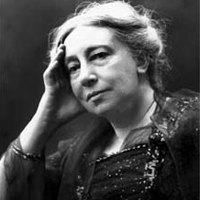The Rising of the Moon by Lady Gregory: Introduction
The Rising of the Moon is a politically motivated one-act play. It is political in its theme. Perhaps it was written by Lady Gregory with a view to propagate sentiments of political independence. By the time Lady Gregory wrote this play, Ireland was still under the direct rule of England.

Lady Gregory (1852-1932)
Irish people were ambiguous as to whether Ireland has to remain as a part of England or a separate nation — state opinions of Irish people as to this decisive matter divided. Since people at large were living a relatively better life, they thought, it as a useless point to struggle for independence. But others thought in a sharply distinct way. According to those who thought in a different way, revolution for political independence is a must. They witnessed several problems generated by the direct British rule in Ireland. Under the iron-heel of direct British rule, Ireland, according to those Irish revolutionary figures; had been losing her cultural resources, her own language and political independence. They no longer remained voiceless over this aspect of the gradual impoverishment of Ireland under the direct rule of England. With a strong conviction to free Ireland from the chain of slavery some Irish revolutionary figures did their level best. Some Irish freedom fighters brought into establishment the Abbey theatre; some brought into existence Gaelic league. Hence, by 1907 Irish revolutionary people brought into operation every kind of revolutionary methods and approaches. They eagerly and optimistically played the hazardous game of revolution. Lots of risks and troubles were associated with this game. Despite those risks and hazards they were strongly committed to their game of revolution. They were optimistic, no matter how pessimistic the situation might be. Thus, this play is a symbolic representation of this optimistic dimension of the Irish revolution for the political independence.
The Rising of the Moon is a story about how a ballad singer, who is a disguised revolutionary hero of Ireland, brought persuasively into change a Sergeant, a loyal worker of the English government. At the beginning of the play we come across the Sergeant tempted to arrest the revolutionary hero for a fixed sum. As the play unfolded, we come to see both the ballad singer and the Sergeant conversing each other. By singing a revolutionary ballad the disguised Irish hero was trying to awaken in the Sergeant feelings of Irish unity, national unity. In the course of telling a ballad the ballad singer deliberately missed some lines, which were supplied by the Sergeant. From this instance, it becomes crystal - clear that the Sergeant had also nationalistic and rebellions sentiments. But these sentiments of rebellion on the part of the Sergeant were stunted by his occupational loyalty to the English government.
The title of The Rising of the Moon comes from a popular old rebel song that pointed to the rising of the moon as the signal for the rising of peoples against oppression. The main characters of the play represent the two opposing forces in Ireland: freedom and independence, personified by the ballad singer (a Ragged Man) and law and order, represented by the Sergeant. The ballad singer is aligned with those who want to change the social structure of Ireland what the people now on the bottom will be on top. The Sergeant's job is to preserve the status quo and avoid such a turning of the tables.
In an important way, the Sergeant and the ballad singer represent the two alternatives that face the modern Irish — now as in the past. One alternative is to accept the power of the English and be in their pay, like the Sergeant; one would then be well fed and capable of supporting a family. The other alternative is to follow the revolutionary path of the ballad singer and risk prison, scorn, and impoverishment. The ballad singer is a ragged man because he has been totally reduced in circumstances by his political choices.
